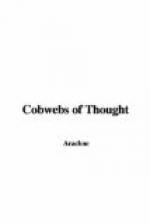Browning was as great an individualist as Carlyle; he stood as far apart from belief in Collective Humanity, and Democracy as Carlyle did, though in Italy, he felt the thrill of its nationality, as Carlyle did not. But Mazzini might have said also truly of Browning, that, with the exception of Italy, “he sympathised with the separate life of each man and not with their collective life.” The sadness Mazzini attributed to Carlyle’s strong individualistic point of view, ought logically then to have been the heritage of Browning also. If Mazzini’s explanation was the true one, it is another proof of the difficulty of tabulating humanity, or of making a science of human nature. For the Individualist Browning, far from being remarkable for sadness, was the greatest of optimists amongst English poets. He had a far wider range of sympathies, than Carlyle, for failure attracted him, as much as victory, the Conquered equally with the Conqueror, indeed every shade of character interested him. Perhaps he expresses through “Cleon” some of his own strongest feelings, his insistence on the worth of individuality, his craving for deeper joy, fuller life than this world gives, and his horror of the destruction of personality. Cleon, the Greek Artist, is indeed “the other side” to the poetic altruism of “The Pilgrims” and “The Choir Invisible.” Never was the yearning for Personal Continuance more vividly and more humanly presented. The Greek Artist, without any knowledge of, or belief in Immortality, hungers after it. Browning represents him as writing to and arguing with the King, who has said:
“My life...... Dies altogether with my brain, and arm,...... ....triumph Thou, who dost not go.”
And Cleon says if Sappho and AEschylus survive because we sing her songs, and read his plays, let them come, “drink from thy cup, speak in my place.”
Instead of rejoicing in his works surviving he feels the horror of the contrast, the life within his works, the decay within his heart. He compares his sense of joy growing more acute and his soul’s power and insight more enlarged and keen, while his bodily powers decay. His hairs fall more and more, his hand shakes, and the heavy years increase.
He realises:—
“The horror quickening....
The consummation coming past escape,
When I shall know most, and yet least
enjoy—
When all my works wherein I prove my worth,
Being present still to mock me in men’s
mouths,
Alive still, in the phrase of such as
thou,
I, I, the feeling, thinking, acting man,
The man who loved his life so over much,
Shall sleep in my Urn. . . It is
so horrible.”
He imagines in his need some future state may be revealed by Zeus.
“Unlimited in capability
For joy, as this is in desire for joy,
To seek which the joy hunger forces us:”
He speculates that this life may have been made straight, “to make sweet the life at large.”




